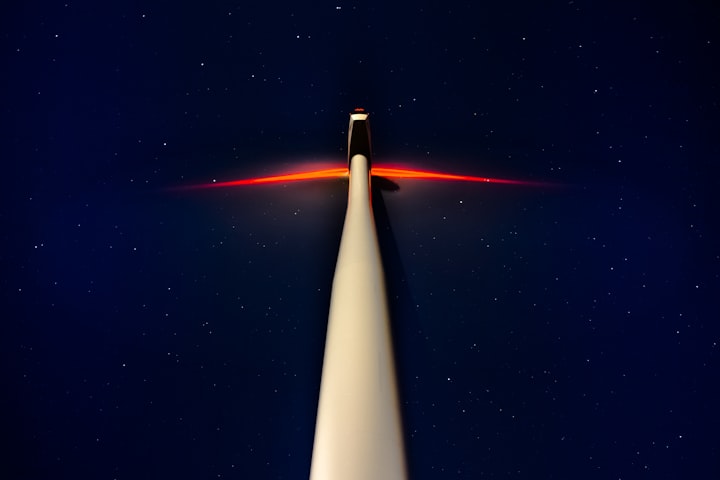Never To Reach Home Again
What began as a routine out-of-Earth activity was to become more than a simple setback for the crew of Solar -7 who were looking forward to returning home to their loved ones

The new generation of the crew aboard the recently commissioned Solar-7 had been on what had rapidly become a historic mission for humanity. They were the first humans to land on Mars, collect samples for return to Earth, and be the first human crew to finally colonize the barren and hostile Martian world.
So far, they had managed to survive living, eating, and breathing within the prefabricated environment, millions of miles from home but, that wasn't to say that the past three long years had been in any way easy for the new world colonists. Three years of trying to survive daily down on the red planet, exploring its surface, conducting experiments, documenting their findings, reporting back to mission control on Earth daily, and prioritizing the 24-hour key position of ensuring the vital life support systems were kept in perfect operating conditions were by no means a bed of roses. Each one of the thirty colonists had also endured isolation, boredom, moments of depression, and personal hardship, but they were so immensely proud of their achievements and eager to share them with the world. It went without saying that they desperately wanted to return home, and soon.
Sure enough, they had all been in regular weekly contact with their families back home yet, it had always felt so impersonal, viewing family members on a monitor, and talking to them via an in-built microphone, having to wait minutes between each speech, as the vast difference between Mars and their home planet painfully delayed the rate of transmission and receipt of all messages at both ends. If humanity ever were to make space exploration and planetary colonization more favorable, then real-time and uninterrupted chatter was most definitely on the hit list of things to urgently improve upon.
Every one of the thirty colonists was finally going to be rotated out tomorrow, after three long years of constant challenges to life down on Mars, the sense of jubilation shared amongst the colonists was felt far and wide across the base. Sure enough, thirty people living, playing, and working together in what was a relatively confined space had produced its own set of challenges. mostly out of familiarity and the constant daily monotonous and unchanging grind. Very quickly the realization of being so far from home, from breathing natural fresh air, confinement from the outdoors for large time periods, and especially having to suit up each time someone needed to venture out from the enclosure of the secure habitat that they had constructed upon the Martian surface, rapidly eroded away at each and every one of the colonists as the days, months, and years slowly passed by.
For the past three years, each one of the colonists had made more sacrifices than they ever thought they would have to. The Martian landscape was never a place for humans let alone children for that matter. Crews were going there to set up a whole new colony that had never in the history of humanity, been accomplished before now, the Martian landscape was far from safe enough to be declared a safe zone for children (at least until the colony had been safely established first.) Long before the mission had been scheduled to leave Earth, every crew member knew this and had accepted the idea that for now at least, Mars was going to be a child-free planet for them. However, the distance between what had been said and what the reality would turn out to be like was an entirely different experience.
As the initial days and months passed the colonists, down on the planet, the harshness of the restriction had begun to rapidly hit home with all of them. The strict regularities of every single day made them all understand just how bleak life down on the planet's surface had become, without any of them hearing the laughter that was so inherent to their children back home, even as much as a simple beaming smile across their faces was missed; that's what was missing within the newly forming colony for the select humans - laughter. What had become far harder was the strict lack of intimacy among them. After all, the truth was, they were all humans with wants and desires and many of the crew had been selected for the fact that they were single and had no relationship ties back home. Obviously, this was not the case with all of the crew but, for the ones that it applied to, it was difficult as time passed them. Sexual intimacy was part of the natural evolution of the species and as such, the odd relationship indeed developed but was rapidly frowned upon by heads of departments.
But nobody could put a total stop to any of that. It was simply anticipated that health precautions would see to it and that a new human life was not 'accidentally' born into the young establishing Martian colony. Emergency medical and surgical facilities had been deployed upon the alien planetary surface but, that was about it, those units had merely been set up as precautionary methods in case of unforeseen incidents; certainly not for any delivery and after-care of a newborn baby.
Supply craft would resupply the base on Mars every six months with what was required to maintain human life there. Oxygen canisters, food supplies, generators, and any medical resupply were the order of those trips, but not much more, and certainly no crew changeovers were factored into any of those. The initial Mars colonization project was a three-year two-way tip only.
But tomorrow was going to change all that.
Tomorrow was going to signal the beginning of the end for them. The flightpath outward bound for Earth, their home planet, was going to change all that. They had all achieved what they had set out to do, out there in the harsh environment of space. It was going to unite each one of them with their families and friends after what had been a very lonely and arduous mission.
That day finally arrived. The Mars colony habitat was set to run on automatic power once all of the crew had boarded the return craft headed for home. Leaving the planet devoid of humans was part of the ongoing mission. It was to be left for a whole year, to be monitored via video links back on Earth, to see how the planet would react to the intrusion left behind by the human colony. A newly replenished crew was to return to the constructed Martian surface exactly one Earth year after the return of the primary crew. The plan was to see how the Martian landscape adversely affected the colony habitat once humans had exited; it would provide vital information to Earth as to what developmental concerns required addressing and reinforcing before any risk to human life was furthered (in considering life support and structural integrity of the habitat.)
They boarded their spacecraft and prepared for their anticipated long-awaited final departure. The launch went smoothly, all thrust modules firing without any hitches, and they soon left Mars behind, a place that had become their home for the last three long years; they entered a transfer orbit that would take them back to Earth in another six months. They rapidly settled into their routine of daily tasks, health checks, and communication with mission control as they had become well-versed with all of it after their time living on the planet, which was slowly becoming that little bit smaller as time progressed, with Earth growing steadily larger each moment they were onboard. Thoughts were quickly turning toward home again and what and who was eagerly waiting for them at that moment when their craft touched down back on solid ground.
Everything was going according to plan until one day when they were approximately four months into their journey, they unexpectedly received a distressing message from Earth.
“Solar-7, this is Houston. We have a problem.”
“What’s wrong?” asked Captain Bertram Gregory, the commander of the crew return mission.
“We’ve detected a large asteroid heading towards your trajectory. It’s moving fast and it’s too late to avoid it.”
“How big is it, what are we looking at?”
“About 25 kilometers in diameter.”
The crew gasped in horror.
“That’s unheard of out here. That could wipe out life on Earth!”
“That's what we are all afraid of but, it would cause severe damage and disruption but wouldn't get us all
. It would be as if several nuclear warheads hit, wiping out millions back home, you might not have much to return to Solar-7. We’re working on a plan to deflect it or destroy it before it reaches us.”
“What about us ? Will it affect us, or can we simply change course and avoid it?”
“Negative. You don’t have enough fuel or time to alter your orbit significantly. You’ll have to brace for impact.”
The deck crew looked at each other with fear and disbelief. Nobody was in any mood to let this information leak out of the bridge area at this point. Their human payload did not in any way need to get wind of this.
“How long do we have?” asked Gregory in an almost slowed-down, disbelieving tone.
“You and your Mars crew and payload have about two hours to attempt to correct your flight path, but even if you achieve this, you are still going to impact some rather distressing and substantial damage from the wake of its tail which spans outward of eighteen miles in all directions. Even emergency course corrections are not going to completely avoid its path. Solar-7 doesn't have sufficient time to fly out of its trajectory.”
The next two hours were filled with panic and despair. The crew tried to contact their families and friends, but most of them were unreachable due to the chaos caused by the asteroid threat. They recorded messages for posterity and prayed for a miracle, hoping that they could get through this alive; there weren't even any assurances that their messages had gotten through successfully. The bridge was a hive of activity, checking the control systems and instruments for any conceivable way to survive or escape its oncoming path. Mission control had already checked and rechecked their available data, but they had to do something. They had to try. But they came up empty and found nothing that was going to guarantee complete impact avoidance. They watched helplessly as the asteroid grew larger in their screens. It was a dark mass of rock and metal that seemed to fill the sky, they had made every single course correction that they could come up and produce in just two hours but, none of that was going to be sufficient enough to avert from at the very least, 62% structural systems damage.
Solar-7 began erratically veering off the planned course as the asteroid's wake caught up on them. They felt a violent jolt as their spacecraft collided with the asteroid at high speed, anything or anyone not strapped down flew off in all directions throughout the craft, causing havoc and untold injuries, many fatal. Their hull was gravely compromised with major breaches occurring. Oxygen quickly began venting into space which resulted in immediate depressurization in most of the vital inhabited areas of Solar-7. Many of the crew rapidly lost consciousness as they had been unable to grab their portable life support suits in time. Human life was losing the fight for survival onboard as they rapidly suffocated in space. Only a handful remained alive from the one area that had avoided a catastrophic breach and that was the bridge.
Their spacecraft continued its course toward Earth, but it was now severely damaged and dangerously off-course. It missed its intended landing site by millions of kilometers and headed on past the home planet on a direct collision course straight for the Moon instead. All course controls were non-functional by now and all the remaining six members of the flight control team could do was pray, hold on, and brace for what was going to be one hell of a disastrous impact. The only hope was to use the remaining thrusters to steer toward the moon colony, where they could land safely and wait for rescue. But that was easier said than done. The asteroid also damaged the navigation system and the communication equipment. The crew had no idea where they were or how to contact anyone.
They flew blindly through space, hoping to catch a glimpse of the moon or any sign of civilization. They knew they had very little time left before their emergency oxygen resources ran out or their ship broke apart.
Only what was to be minutes later, Solar-7 nose-dived into the Moon, crashing into the lunar surface with a massive fireball that sent dust and fragments of wreckage flying across the surface of the Moon's landscape. If anything were to come out of this with any degree of positivity it was that Solar-7 had smashed into the farthest side of the regolith on the outer boundary markers that signified the substantial long-established monitoring and waypoint base, which had been established ten years before the start of the Martian primary colony outpost.
The samples that had been collected and studied from Mars over the last year were laid waste across the Moon along with chunks of metal and uncountable remains of the space mission Solar-7. No one ever recovered them or learned what secrets they held.
Solar-7 had been tasked with bringing home the first-ever human crew of Mars, on its way back home to reunite loved ones with their desperate families and friends - they had been hailed as heroes, carrying thirty astronauts and along with them, a cargo of precious samples. The mission had been a success, and the crew was looking forward to seeing their families and friends again.
But then, disaster struck. A rogue asteroid, undetected by the radar, slammed into the side of the spacecraft, tearing a hole in its hull, and sending it spinning out of control. The crew had valiantly attempted to stabilize the ship and patch up the damage, but it was too late. Solar-7 had lost its main engine, its life support, and most of its fuel.
Meanwhile, on the moon colony, a young engineer by the name of Leah had been working on her latest project: a prototype of a lunar rover that could explore the dark side of the moon in far more detail than could have been achieved before. She had been tasked with testing its sensors and cameras when she noticed something strange on her monitor. She zoomed in and saw a faint trail of smoke in the sky. She realized it was a spacecraft in distress, but even more so after the lunar base had been on alert status ever since the monitory systems both on the base and back on Earth had pieced together emergency contingencies immediately in response to mission control alerting Solar-7 of the asteroid, so the Moon was frantically scouring the vastness of space for indications.
Leah quickly alerted her supervisor and grabbed her helmet and suit.
She ran outside and strapped herself into her rover. She drove towards the smoke trail, hoping to find survivors, anyone, anything. She knew it was risky, but she felt compelled to support the collision in some way. The young engineer reached the crash site, sighting a colossal, mangled, and unrecognizable wreck of metal fragments and wires. After initially having carried out scanning for signs of initial life, she was surprised to discover one exceptionally faint beating life sign: a weak pulse coming from inside the cockpit.
She used her rover's tools to cut through the debris and reached for the hatch. She clawed it slightly open, just enough to poke her head through which was enclosed within her pressurized helmet and her mag light, catching sight of one survivor. One astronaut lay there, still strapped into the seat enclosure, the suit covered in blood and fluids from the hydraulic equipment that had been exposed from the crash landing.
The motionless body made no attempt to respond, the only way Leah could verify the survivor was still barely alive, was because her portable life-signs detector was beeping incessantly. Leah managed to squeeze through the gap she had forced in the hatch, smiled, and said: "Don't worry. You're safe now," not really expecting to get any response.
She struggled to unclip the harness supports that had been holding the survivor into the seat. She rechecked the vital signs once more and connected the secondary oxygen supply hose from her tank situated to her back to the motionless suit to supply some much-needed oxygen to its occupant.
She tapped the inset hub on her suit and radioed back to her supervisor: "I've found one survivor from Solar-7. I need an emergency medical retrieval team to get him to the life-support center ASAP."
"Good job, Leah," her supervisor said. "I'm alerting the team now to dispatch to your position."
She stared at the astronaut as she supported him in her arms. wondering who he was, where he came from, and what he had seen on Mars. His patch insignia had been severely burned beyond any point of recognition. Leah's mind wondered, did he have a family, and if he would ever see his home again. Much back on Earth was uncertain right now, all she could hope for was to save his life right now.
*****
Thank you for taking the time to read this😊. I hope you have enjoyed this article today. Please read and click the heart after reading ❤️ to show your support.
If you fancy tipping me or pledging your support in these ways too then I'll have to hug you🤣😊.

Tips are a great way to show your support and help me in continuing my writing journey, and are amazing to get😍👍...
More of my articles can be found by clicking on my profile page. If you are feeling adventurous and creative, then why not join us at the Vocal+ platform by clicking on this here?
Or why not come and chat with me over on Medium too, where I also write too?
About the Creator
Jonathan Townend
I love writing articles & fictional stories. They give me scope to express myself and free my mind. After working as a mental health nurse for 30 years, writing allows an effective emotional release, one which I hope you will join me on.






Comments (1)
Fantastic!!!💖💖💕